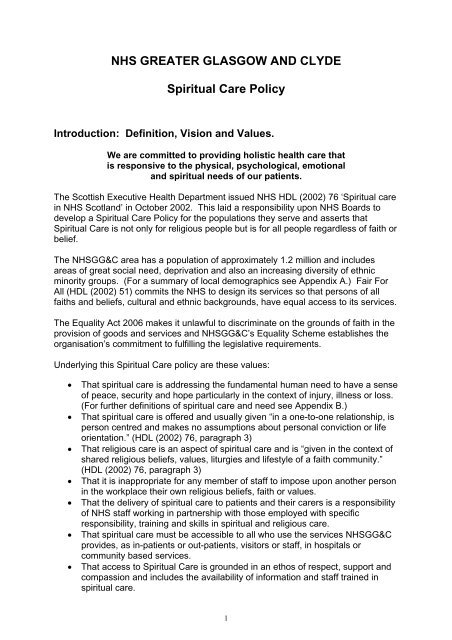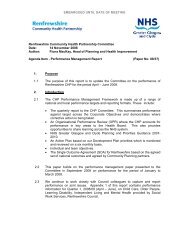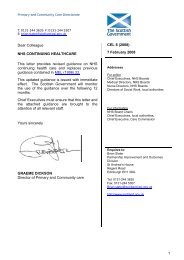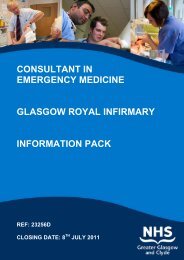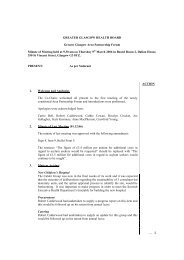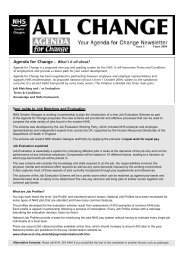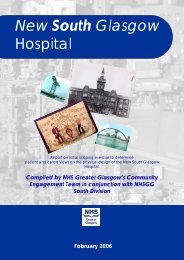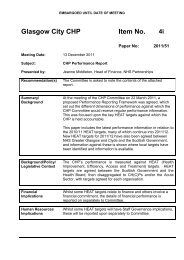NHS GREATER GLASGOW AND CLYDE Spiritual Care Policy
NHS GREATER GLASGOW AND CLYDE Spiritual Care Policy
NHS GREATER GLASGOW AND CLYDE Spiritual Care Policy
Create successful ePaper yourself
Turn your PDF publications into a flip-book with our unique Google optimized e-Paper software.
<strong>NHS</strong> <strong>GREATER</strong> <strong>GLASGOW</strong> <strong>AND</strong> <strong>CLYDE</strong><br />
<strong>Spiritual</strong> <strong>Care</strong> <strong>Policy</strong><br />
Introduction: Definition, Vision and Values.<br />
We are committed to providing holistic health care that<br />
is responsive to the physical, psychological, emotional<br />
and spiritual needs of our patients.<br />
The Scottish Executive Health Department issued <strong>NHS</strong> HDL (2002) 76 ‘<strong>Spiritual</strong> care<br />
in <strong>NHS</strong> Scotland’ in October 2002. This laid a responsibility upon <strong>NHS</strong> Boards to<br />
develop a <strong>Spiritual</strong> <strong>Care</strong> <strong>Policy</strong> for the populations they serve and asserts that<br />
<strong>Spiritual</strong> <strong>Care</strong> is not only for religious people but is for all people regardless of faith or<br />
belief.<br />
The <strong>NHS</strong>GG&C area has a population of approximately 1.2 million and includes<br />
areas of great social need, deprivation and also an increasing diversity of ethnic<br />
minority groups. (For a summary of local demographics see Appendix A.) Fair For<br />
All (HDL (2002) 51) commits the <strong>NHS</strong> to design its services so that persons of all<br />
faiths and beliefs, cultural and ethnic backgrounds, have equal access to its services.<br />
The Equality Act 2006 makes it unlawful to discriminate on the grounds of faith in the<br />
provision of goods and services and <strong>NHS</strong>GG&C’s Equality Scheme establishes the<br />
organisation’s commitment to fulfilling the legislative requirements.<br />
Underlying this <strong>Spiritual</strong> <strong>Care</strong> policy are these values:<br />
• That spiritual care is addressing the fundamental human need to have a sense<br />
of peace, security and hope particularly in the context of injury, illness or loss.<br />
(For further definitions of spiritual care and need see Appendix B.)<br />
• That spiritual care is offered and usually given “in a one-to-one relationship, is<br />
person centred and makes no assumptions about personal conviction or life<br />
orientation.” (HDL (2002) 76, paragraph 3)<br />
• That religious care is an aspect of spiritual care and is “given in the context of<br />
shared religious beliefs, values, liturgies and lifestyle of a faith community.”<br />
(HDL (2002) 76, paragraph 3)<br />
• That it is inappropriate for any member of staff to impose upon another person<br />
in the workplace their own religious beliefs, faith or values.<br />
• That the delivery of spiritual care to patients and their carers is a responsibility<br />
of <strong>NHS</strong> staff working in partnership with those employed with specific<br />
responsibility, training and skills in spiritual and religious care.<br />
• That spiritual care must be accessible to all who use the services <strong>NHS</strong>GG&C<br />
provides, as in-patients or out-patients, visitors or staff, in hospitals or<br />
community based services.<br />
• That access to <strong>Spiritual</strong> <strong>Care</strong> is grounded in an ethos of respect, support and<br />
compassion and includes the availability of information and staff trained in<br />
spiritual care.<br />
1
• That Health <strong>Care</strong> Chaplains are key providers and enablers of spiritual care to<br />
patients and their carers and all <strong>NHS</strong> staff.<br />
These values are consistent with the principles of a spiritual care service as<br />
described in <strong>NHS</strong> HDL (2002) 76. The <strong>NHS</strong>GG&C <strong>Spiritual</strong> <strong>Care</strong> service will develop<br />
and deliver its services in accordance with these values.<br />
Structures<br />
Health <strong>Care</strong> Chaplaincy, as a publicly funded service within the <strong>NHS</strong>, is regarded as<br />
an integral component, among many, working for the well-being of patients, their<br />
carers and staff.<br />
• The Chaplaincy / <strong>Spiritual</strong> <strong>Care</strong> Service is located within the Rehabilitation and<br />
Assessment Directorate with a designated director who has managerial<br />
responsibility.<br />
• Service delivery is managed by the Head of Chaplaincy and <strong>Spiritual</strong> <strong>Care</strong><br />
and, at a local level, responsibility lies with Chaplaincy Departments (which<br />
may be known by that name or another) covering the Acute Services Division,<br />
The Mental Health Partnerships and Community Health (<strong>Care</strong>) Partnerships.<br />
• The delivery of healthcare within the <strong>NHS</strong> is multidisciplinary in nature and<br />
individualised care plans should consider the physical, social, psychological<br />
and spiritual needs of patients<br />
• Chaplains have an important role to play as fully integrated members of the<br />
multidisciplinary health care team and also, where appropriate and practical,<br />
as members of local multi-disciplinary teams.<br />
• Provision for the Chaplaincy / <strong>Spiritual</strong> <strong>Care</strong> of patients from the smaller faith<br />
communities will be monitored and where necessary reviewed.<br />
• Health <strong>Care</strong> Chaplains are bound by the same policies and codes of conduct<br />
(e.g. patient confidentiality) as all <strong>NHS</strong> employees and volunteers.<br />
• The Chaplaincy Service will be consulted, where appropriate, to ensure that<br />
policies and procedures incorporate the role of chaplains / spiritual care givers<br />
(for example, Major Incident Procedures, Bereavement, Race Equality etc.)<br />
Practices<br />
The Chaplaincy Service will ensure that Health <strong>Care</strong> Chaplains deliver their<br />
care in accordance with the principles below and the Professional<br />
Standards/Code of Conduct of the Health <strong>Care</strong> Chaplaincy Professional<br />
Organisations.<br />
It has been the practice, since the formation of the <strong>NHS</strong> in 1948, for Health <strong>Care</strong><br />
Chaplains to be employed to deliver religious and spiritual care. Clergy and faith<br />
community leaders who come to a hospital to visit a member of their community are<br />
not <strong>NHS</strong> Health <strong>Care</strong> Chaplains. The understanding of spiritual and religious care<br />
has evolved due to increased recognition of the religious needs of ethnic minorities<br />
and the spiritual needs of those who do not identify themselves with any particular<br />
belief or faith. In this pluralist society, individual beliefs find expression in a<br />
multiplicity of forms.<br />
2
This entails:<br />
• Impartiality, accessibility and availability (including a 24hour on call service).<br />
• Sensitivity, compassion and the ability to make and maintain attentive, helping<br />
and supportive relationships.<br />
• Respect for the diversity of faiths, beliefs, lifestyles and cultural backgrounds<br />
within the population.<br />
• The sensitive addressing of pastoral needs through worship, liturgies,<br />
ceremonies and rituals that have religious and spiritual integrity.<br />
• Good working relationships with other health care professionals, leaders of<br />
local faith communities, voluntary groups, trade unions and professional<br />
organisations.<br />
People<br />
People are the key to the delivery of spiritual care.<br />
The Chaplaincy Service will therefore ensure that:<br />
• Working with Learning and Education / Practice Development, training in<br />
spiritual needs and spiritual care will be included in staff training programmes,<br />
including induction programmes, and training will be available to all staff.<br />
• Training will include awareness of the religious traditions and needs of faith<br />
communities.<br />
• Health <strong>Care</strong> Chaplains personal learning needs will be identified and<br />
supported<br />
• Health <strong>Care</strong> Chaplains will receive an appropriate form of supervision for their<br />
own emotional, psychological, pastoral and spiritual support.<br />
• Chaplaincy Volunteers, where used, will be integrated into the Volunteering<br />
<strong>Policy</strong> and will receive appropriate training. The valuable role of volunteers in<br />
assisting the delivery of spiritual care is recognised and affirmed.<br />
• Health <strong>Care</strong> Chaplains will support staff within the organisation and provide a<br />
confidential service of pastoral care.<br />
Place<br />
<strong>NHS</strong>GG&C is responsible for reviewing on an ongoing basis the provision of<br />
facilities for their Departments of <strong>Spiritual</strong> and Religious <strong>Care</strong>.<br />
• Facilities will include places appropriate for use by people of all faiths or no<br />
faith for the purposes of:<br />
o Quiet reflection, meditation and prayer;<br />
o Meetings and pastoral counselling;<br />
o <strong>Spiritual</strong> and religious ceremonies.<br />
• Facilities will be available for use by patients, visitors and staff. This might<br />
comprise a Chaplaincy Centre but, where reasonably possible, additional<br />
rooms must be provided in easily accessible locations for use by patients and<br />
visitors for quietness, prayer and pastoral counselling.<br />
3
• Where <strong>NHS</strong>GG&C is commissioning new buildings the provision of<br />
accommodation for spiritual and religious care services must be included as<br />
part of the specification. Consultation with local faith communities will be<br />
undertaken with reference to the design, decoration and furnishings of any<br />
new facility for spiritual and religious care. Whilst a space for prayer and quiet<br />
is necessary so also is attention to the physical surroundings of a building.<br />
The architecture, design and decoration of health care facilities, the level of<br />
noise, the outlook from windows, can all contribute to the spiritual well-being of<br />
patients and so to their total health.<br />
Partnership<br />
• <strong>NHS</strong>GG&C will promote partnership between the Chaplaincy / <strong>Spiritual</strong> <strong>Care</strong><br />
service and local faith communities on the provision of services and the<br />
appointment, employment and training of chaplains. It will ensure that<br />
procedures are in place for the spiritual and religious care of those who belong<br />
to smaller faith communities.<br />
• Where there is a requirement that care is provided to members of those<br />
communities by their own religious leaders, necessary arrangements will be<br />
made. Where these include paid remuneration the Chaplaincy Service will<br />
ensure that appropriate standards are set and maintained.<br />
• <strong>NHS</strong>GG&C recognises that the faith communities are a resource for training<br />
<strong>NHS</strong> staff in care which is culturally competent .<br />
• <strong>NHS</strong>GG&C will promote partnership between its Chaplaincy / <strong>Spiritual</strong> care<br />
service and other healthcare providers, self-help organisations, voluntary<br />
bodies and educational institutions.<br />
• The <strong>NHS</strong>GG&C <strong>Spiritual</strong> <strong>Care</strong> Committee will promote dialogue with faith<br />
communities and create opportunities for information sharing and education.<br />
• <strong>NHS</strong>GG&C will ensure that where <strong>NHS</strong> funds are used to secure services<br />
from non-<strong>NHS</strong> bodies that these services will include provision of spiritual<br />
care.<br />
Accountability and Governance<br />
• To facilitate communication between service providers, faith communities,<br />
chaplains and managers, <strong>NHS</strong>GG&C established a <strong>Spiritual</strong> <strong>Care</strong> Committee<br />
which follows the remit and membership suggested in <strong>NHS</strong> HDL (2002)76<br />
(see Appendix C.)<br />
• The Committee will receive regular reports on the service through the Head of<br />
Chaplaincy and <strong>Spiritual</strong> <strong>Care</strong>.<br />
• The <strong>Spiritual</strong> <strong>Care</strong> Committee is a sub-committee of <strong>NHS</strong> Greater Glasgow<br />
and Clyde Involving People Committee and will report to that Committee<br />
through the submission of its minutes.<br />
Lead manager / author: Blair Robertson<br />
Responsible director: Anne Galbraith<br />
Date of approval 29 January 2008<br />
Approving body:<br />
<strong>NHS</strong>GG&C <strong>Spiritual</strong> <strong>Care</strong> Committee<br />
Date for review: Jan 2010<br />
4
Appendix A: Local Demographics<br />
Glasgow (%) Argyll & Clyde (%) Scotland (%)<br />
Church of<br />
31.5<br />
Scotland<br />
41.6 42.4<br />
Roman Catholic 29.2 24.4 15.9<br />
Other Christian 4.1 6.1 6.8<br />
Buddhist 0.2 0.1 0.1<br />
Hindu 0.2
eligious associations yet recognise their need for spiritual care, look for a skilled and sensitive listener<br />
who has time to be with them. A person who will acknowledge the deep desires and stirrings of their<br />
spirit, recognise the significance of their relationships, value them and take them seriously. A person<br />
who can help them to find within themselves the resources to cope with their difficulties and the<br />
capacity to make positive use of their experience of illness and injury. The <strong>NHS</strong> must offer both<br />
spiritual and religious care with equal skill and enthusiasm.”<br />
(<strong>NHS</strong> HDL (2002) 76 Paragraph 4)<br />
Appendix C: A <strong>Spiritual</strong> <strong>Care</strong> Committee<br />
Paragraphs from <strong>NHS</strong> HDL (2002) 76 - <strong>Spiritual</strong> <strong>Care</strong> in <strong>NHS</strong> Scotland<br />
10<br />
<strong>NHS</strong> Boards are required, in consultation with its service providers, to establish a <strong>Spiritual</strong> <strong>Care</strong><br />
Committee to support the integrated planning and delivery of spiritual care services across the area<br />
they serve. The Committee should normally meet at least twice a year. Its membership should reflect<br />
the size and nature of the <strong>NHS</strong> organisations and faith communities in the area served. As a minimum<br />
it should consist of:<br />
• An <strong>NHS</strong> Board nominee to act as convenor;<br />
• Representatives of the main faith communities in the area served, nominated by the<br />
appropriate presbytery, bishop, faith community governing body or inter faith council;<br />
• Two lay persons nominated by the local Health Council, or other appropriate patient<br />
representative organisation, such as a Patients’ Council;<br />
• Representatives of <strong>NHS</strong> staff with an interest in spiritual and religious care;<br />
• Representatives of the area’s spiritual care staff and volunteers; and<br />
• The Head of the Department of Religious and <strong>Spiritual</strong> <strong>Care</strong> and the <strong>Spiritual</strong> <strong>Care</strong> Manager of<br />
each local service provider.<br />
11<br />
The remit of a committee should include:<br />
• Providing advice on, and a forum for developing the <strong>NHS</strong> Board’s spiritual care policy and<br />
overseeing its local implementation;<br />
• Maintaining partnership between the local healthcare system, its spiritual care staff and local<br />
faith communities;<br />
• Providing an advisory function to spiritual caregivers; and<br />
• Overseeing the process of appointment of spiritual care staff.<br />
12<br />
Each local service provider may wish to establish a local sub-committee to oversee the delivery of the<br />
local spiritual care service. Membership of the sub-committee should reflect the size and nature of the<br />
organisation and faith communities in the area it serves.<br />
6


